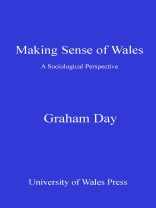Making Sense of Wales gives an account of the main changes that have taken place in Welsh society over the last fifty years, as well as analysing the major efforts to interpret those changes. By placing work done in Wales in the context of broader developments within sociological approaches over the period, Graham Day demonstrates that there is a body of work on Wales worth considering in its own right as a specific contribution to sociology. He also shows the relevance of sociological accounts of Wales for understanding contemporary empirical and theoretical concerns in social analysis. Beginning with post-war analysis which considered Wales in terms of regional planning and policy, Day shows how more theoretically informed perspectives have come to the fore in recent years. He also examines more contemporary developments, such as gender and class transformations, the emphasis on the centrality of the Welsh language for conceptions of Wales and Welshness, as well as the impact of new forms of governance and questions of social exclusion.
قائمة المحتويات
Series Editor’s Foreword Acknowledgements Introduction 1. Visions of Wales 2. Wales Remade? The Transformation of Economic Structures 3. ‘An Ideal Research Site’: Wales and the Problem of Development 4. Enclaves, Archipelagos and Regions: Rethinking the Regional Problem 5. Divided and Dividing Wales? Explorations in Geography and Class 6. Beyond the Basics 7. Rural Wales: The Sociological Account 8. Contemporary Rural Wales: Via Development to Dependence? 9. Debating the Transformation: A Welsh Economic Miracle? 10. Language, Culture and Nation: Wales in the Melting Pot 11. Nation, Nationalism and Ethnicity Conclusion References Index












